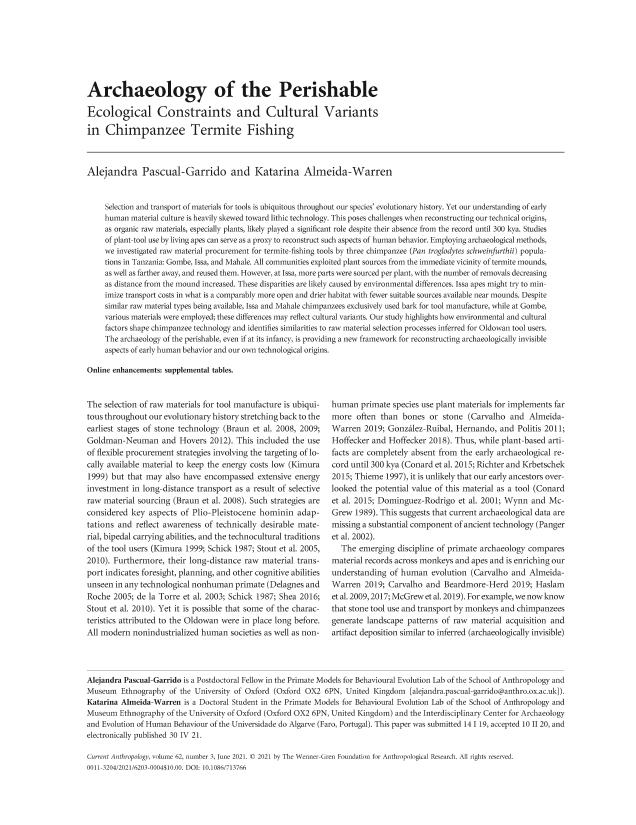Artículo
Archaeology of the perishable ecological constraints and cultural variants in chimpanzee termite fishing
Fecha de publicación:
06/2021
Editorial:
University of Chicago Press
Revista:
Current Anthropology
ISSN:
0011-3204
Idioma:
Inglés
Tipo de recurso:
Artículo publicado
Clasificación temática:
Resumen
Selection and transport of materials for tools is ubiquitous throughout our species’ evolutionary history. Yet our understanding of early human material culture is heavily skewed toward lithic technology. This poses challenges when reconstructing our technical origins, as organic raw materials, especially plants, likely played a significant role despite their absence from the record until 300 kya. Studies of plant-tool use by living apes can serve as a proxy to reconstruct such aspects of human behavior. Employing archaeological methods, we investigated raw material procurement for termite-fishing tools by three chimpanzee (Pan troglodytes schweinfurthii ) populations in Tanzania: Gombe, Issa, and Mahale. All communities exploited plant sources from the immediate vicinity of termite mounds, as well as farther away, and reused them. However, at Issa, more parts were sourced per plant, with the number of removals decreasing as distance from the mound increased. These disparities are likely caused by environmental differences. Issa apes might try to minimize transport costs in what is a comparably more open and drier habitat with fewer suitable sources available near mounds. Despite similar raw material types being available, Issa and Mahale chimpanzees exclusively used bark for tool manufacture, while at Gombe, various materials were employed; these differences may reflect cultural variants. Our study highlights how environmental and cultural factors shape chimpanzee technology and identifies similarities to raw material selection processes inferred for Oldowan tool users. The archaeology of the perishable, even if at its infancy, is providing a new framework for reconstructing archaeologically invisible aspects of early human behavior and our own technological origins.
Palabras clave:
CHIMPANZEE
,
TOOL USE
,
EARLY HOMININ
Archivos asociados
Licencia
Identificadores
Colecciones
Articulos(ISES)
Articulos de INST.SUPERIOR DE ESTUDIOS SOCIALES
Articulos de INST.SUPERIOR DE ESTUDIOS SOCIALES
Citación
d'Errico, F.; Backwell, Lucinda Ruth; Archaeology of the perishable ecological constraints and cultural variants in chimpanzee termite fishing; University of Chicago Press; Current Anthropology; 62; 3; 6-2021; 333-362
Compartir
Altmétricas




